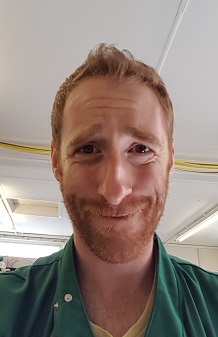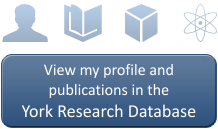Dr Matthew Reilly
EPSRC Innovation Fellow
Research
My field of interest covers the development of industrial biotechnology processes which utilise microbial communities with the ability to perform dark fermentation and anaerobic digestion. These biological processes can be used to remove pollutants from waste and for the production of chemicals and fuels from biomass. I have a particular interest in the use of wastewaters and cereals straws as feedstocks for the production of biohydrogen, biomethane, electricity and bioplastics. My laboratory studies the utilisation of bacteria and fungi, in controlled anaerobic environments, to achieve those goals.
Some of our research contributions to date include the first demonstration of biohydrogen production from alkaline pre-treated wheat straw by mixed-cultures, development of a low-cost method for dark fermentation studies and the discovery of experimental bias in the typical methodologies which have been used to compare single- and two-stage industrial anaerobic digestion. Contributions have also been made towards the development of the first automated systems for monitoring the growth of anaerobic gut fungi (Neocallimastigomycota). Furthermore, my laboratory is constructing a novel bioreactor that has been designed to automate the culturing of anaerobic gut fungi in vitro. Anaerobic gut fungi are native to the gastrointestinal tract of ruminant herbivores and have an extensive capability to breakdown a range of plant materials and convert them into biohydrogen fuel and acetic acid. Acetic acid is a suitable carbon source for feeding a wide range of microbes which can produce biofuels and biomaterials.
Our expertise includes the following:
- anaerobic digestion
- dark fermentation
- anaerobic fungi
- pilot-scale bioreactor design and scoping studies
- anaerobic microbiology
- pre-treatment of lignocellulose/straw for biogas production
- wastewater treatment
- volatile fatty acid production
- biomethane potential (BMP) tests
- biohydrogen potential (BHP) tests
- continuous anaerobic digestion feasibility studies
Teaching and scholarship
![]()
Amongst the top fundamental lessons in our society are that it is not okay to cheat or steal! However, I wish to make an exception to these rules by encouraging students to undertake what I term as “Evolutionary Theft”. The concept of Evolutionary Theft is to explore the environment for natural biological activities which have evolved to produce useful medicines, chemicals, materials or fuels (eg antibiotics, plastics, biogas) and utilise these processes responsibly in our biotechnology industries. My teaching goal is to inspire students enthusiastically and convince them that they have the potential to contribute to solving some of the global research challenges that we face. The aim is to enable students to appreciate how they can ‘cheat’ and obtain a head-start of hundreds of millions of years by applying Evolutionary Theft to discover, mimic, develop and control the ready-made solutions provided by the natural selection of plants and microbes throughout our world.
![]()
Projects offered will focus on anaerobic biotechnology. The activities in my laboratory are geared towards industrial applications and being hands on! Therefore, projects undertaken will be suitable for students who are interested in industrial biotechnology process design. Typical projects will relate to the anaerobic conversation of biomass (eg wastewaters, manures, cereal straws) into chemicals (eg fertilisers, medicines), fuels (eg hydrogen, methane), electrical power or materials (eg plastics).


